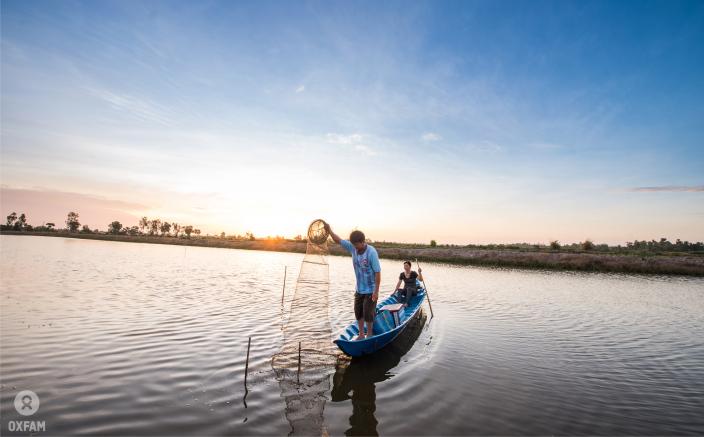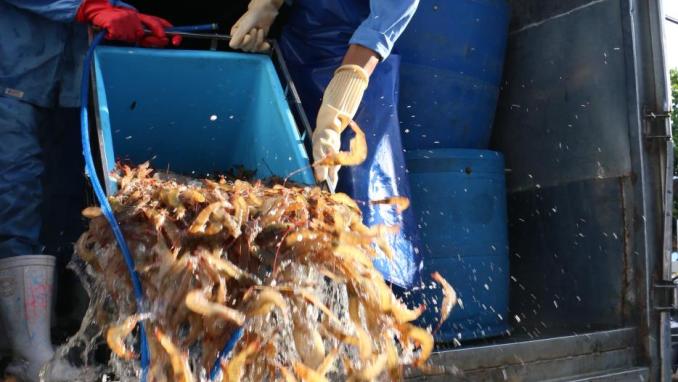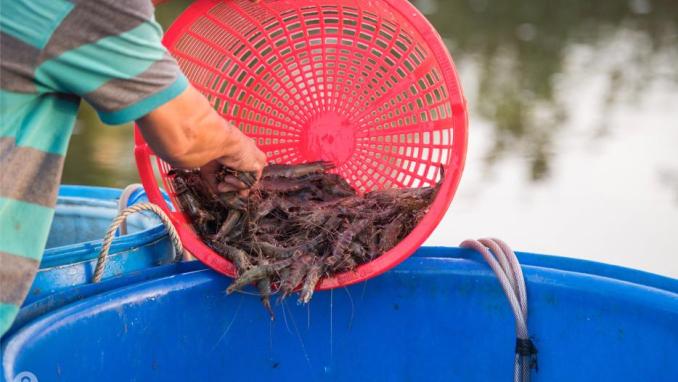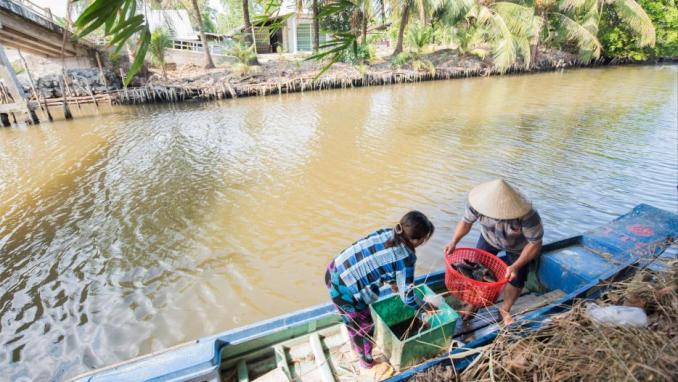
In the past: The challenge of shrimp farming in Vietnam
Driven by expansion in shrimp farming areas and rapid productivity growth, Vietnam is now one of the world’s leading shrimp producers and exporters — with the Mekong Delta in Southern Vietnam its leading shrimp production area. Despite this rapid growth, however, the sector faces significant issues that limit not only further growth but also the degree to which farmers and shrimp processor factory workers are able to benefit.
A key underlying cause of this is the way shrimp are bought. Processors largely buy shrimp from intermediaries who, in turn, buy from various and changing farmers who have low supply chain reliability — both for quantity and quality. At the same time, international buyers increasingly require assured high- quality shrimp, such as through certification on the Aquaculture Stewardship Council (ASC) standards.
For farmers, this model means uncertainty in market access and income. Farmers have limited negotiating power to push up prices and must contend with lower price due to lower shrimp quality and failure to meet all-sector standards. This is while they face the steepest risks in the value chain, in particular as climate change makes production significantly less reliable. Moreover, while incomes from factory jobs are more secure for the largely female workforce in the shrimp industry, these jobs have also been historically of low quality, with significant health and safety concerns, unpredictable hours and overtime, and limited childcare support or flexibility.
Systems innovation: A new contract farming model
In response to this, GRAISEA, through the International Centre for Aquaculture & Fisheries Sustainability (ICAFIS), reached out to various companies to pilot purchasing directly from farmer groups and workforce management. One of these companies is South Vina Shrimp (SVS), a newer shrimp processing company that had only opened its first factory in 2015. SVS used to depend on unreliable intermediaries, as it lacked its own shrimp ponds.
SVS is managing two shrimp processing plants. The one in Cà Mau Province is focused on mangrove organic shrimp farming, while the one in Bac Lieu is focused on selling ASC-certified shrimp to international buyers.
In Bac Lieu, there was an opportunity to support the company to develop a contract farming model focused on ASC standard compliance, whereby SVS directly sources shrimp from farmer cooperatives — leaving out intermediaries — based on pre-agreed contracts between the two sides.
The contracts include not only the date and price of sale but also a premium and the commitments by SVS to provide training and production inputs to farmer groups. For farmers, the benefits of guaranteed markets, production support, and potentially higher prices are clearer. For SVS, the model has the potential to address their supply issues and allow them to reach ASC standards.
Implementation: Supporting SVS
When GRAISEA started working with SVS in 2018, contract farming was not widespread in the sector. SVS had not used such contracts before or directly procured from farmer groups. Initially, SVS was worried that the model would not work and that the farmers would not be able to stick to their commitments. GRAISEA spent time persuading the company directors of the benefits, such as a stronger and more stable supply chain, production meeting ASC standards, and increased traceability of produce.
Contracts were initially tested with two cooperatives. The terms included a commitment to purchase shrimp produced after harvest; a core price of 1–2% above current market prices and 3–5% above for ASC-certified shrimp; SVS to pay all ASC standard audit costs; and SVS to provide inputs to farmers, including annual training on ASC standads and quality control, 50% of seed costs for extensive farms and physical upgrades for intensive farms (e.g., improved sediment ponds and nets to enhance bio-security). To derisk the use of contracts for the first time, GRAISEA hired a consultant to train farmers on how to set up and manage cooperatives, and on the specific ASC production standards that SVS requires for its shrimp export markets.
As the model gained traction, GRAISEA decreased its investment in subsequent contracts with cooperatives, but it continued to link SVS to farmers. SVS and the farmers then managed the establishment and maintenance of the cooperatives and set up the contracts themselves.
Since 2018, GRAISEA has also been supporting working conditions at SVS’s Bac Lieu factory, where over 600 people work, by training middle management quality and human resource staff on key issues, such as improving working conditions, labor policies, and international standards. GRAISEA also supports the annual labor negotiations between the company board and labor representatives. Moreover, GRAISEA has also supported SVS to develop a female workers policy, including addressing sexual harassment and recruiting women into increasingly senior roles.
More recently, GRAISEA has supported SVS to establish a new mechanism to help staff share their views through the development of an employee feedback mobile application and a touch screen physical system for workers to highlight their satisfaction levels with varying questions posed. Feedback is regularly reviewed in monthly company directors’ meetings. GRAISEA funded the mobile application, while SVS funded the touchscreen computer.
Impact: A more secure shrimp market and supply chain
By the end of 2022, SVS has established contracts with 10 cooperatives. This means that around 4,400 farmers now have more secure market access, and have benefited from training and inputs provided. Four of the cooperatives are now certified on ASC standards, while the others are on their way to being certified as well.
This model is viewed as highly sustainable, as it works in the interest of both farmers and businesses. SVS now has a more secure supply chain and is able to buy higher-quality shrimp needed for international markets.
Indeed, SVS has been so convinced of the importance of securing the well-being of local farmers to its own success that it is now starting, with GRAISEA support, to work with cooperatives to help them develop a natural disaster reserve fund, with contributions from the business. Five other businesses have also reached out to GRAISEA for support in establishing similar worker feedback mechanisms and are in the process of setting up such mechanisms.
For farmers, they now have higher income security, increased overall farming productivity, and a more powerful voice, as they work together in farming cooperatives. The incomes of the 4,400 farmers have roughly increased by 10–15%.
For workers, they feel more empowered to share their grievances and recommendations with SVS. This led to specific changes, including reduced working hours for breastfeeding mothers, expanded maternity leave, and free food in the company canteen. Going forward, these new approaches to contract farming and enhanced company worker feedback mechanisms could be real game changers for the broader shrimp sector.


